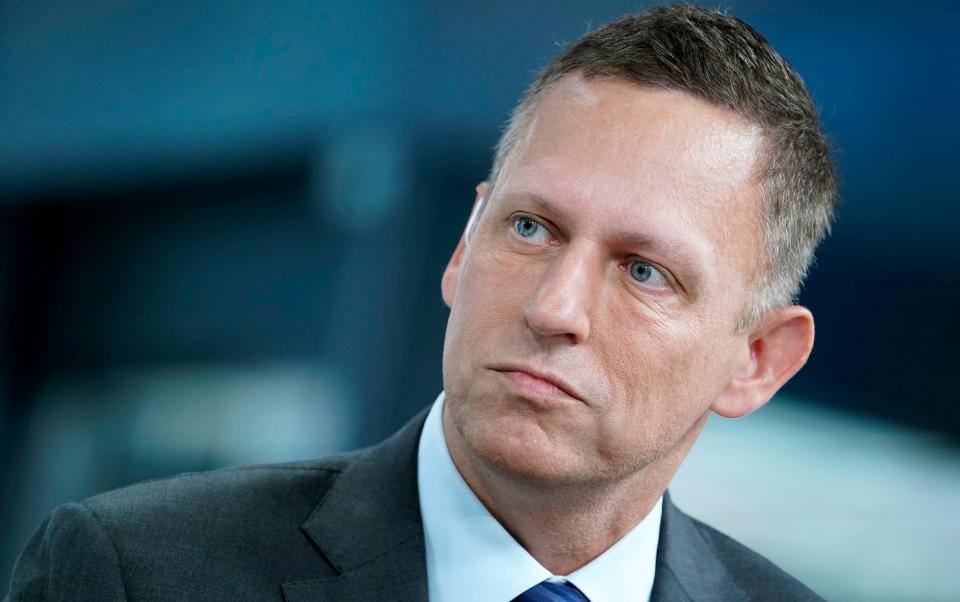Ukraine has turned to a company founded by Silicon Valley billionaire Peter Thiel to clear thousands of square miles of mines and explosives.
The deal will see Palantir supply Ukraine with its artificial intelligence (AI) tools to organise and accelerate its demining efforts.
Ukraine is hoping to decontaminate 80pc of its potentially mined land within 10 years and bring it back into economic use, freeing up millions of acres of farmland. Roughly a third of the country’s landmass is thought to be hazardous owing to mines or unexploded ordnance.
The World Bank has estimated efforts to remove the explosives could cost up to $38bn (£30bn), with Ukraine seeking international deals and support to accelerate the effort even as it grapples with Russian advances in the Donbas.
The 12-month agreement with Palantir builds on an earlier pilot programme. Palantir’s technology can be used to create a digital map of Ukraine’s territory and resources, such as heavy machinery and drones, and prioritise its clearance efforts.

Yulia Svyrydenko, Ukraine’s economic minister, said clearing Ukraine’s land would take “decades with the resources we have”.
“We’ve discussed with Palantir the opportunity to set up a programme for a more sophisticated approach”, she said. “It is very important to prioritise.”
The country has approximately 50 heavy demining machines and has trained around 3,500 sappers. It is seeking to double the number of machines it has available in deals with overseas suppliers and by boosting local factories.
Louis Mosley, Palantir’s European executive vice president, said the company’s technology “allows you to make a data driven decision about the highest priority area to demine”.
The deal with Palantir does not have an initial upfront cost to Ukraine.
Mr Mosley said: “Fundamentally we are doing this because we believe supporting Ukraine is the right thing to do.”
Ukraine is struggling to plug its huge budget deficit and restart its economy even as politicians in Washington DC delay a crucial aid package for Kyiv. It comes as Ukraine is forced to retreat from eastern villages following Russia’s capture of Avdiivka in February after months of costly fighting.
In an interview with The Telegraph, Ms Svyrydenko called on the US to “follow the same example” of Europe and pass the multibillion-dollar support package. A $54bn EU deal to provide more aid to Ukraine was agreed in February.
However, she added some EU officials still needed to be persuaded to unlock further funds by sending frozen Russian cash to Ukraine. Hundreds of billions of euros are locked in Russian bank accounts across the EU, with calls to use the interest for Ukrainian aid.

“During this year our minimum goal is to get at least income from the frozen assets,” Ms Svyrydenko said. “I believe that our professional team will be able to persuade. But it is the right direction.”
On Wednesday, Ursula von der Leyen, the European Commission president, expressed her backing for the idea, while Rishi Sunak has been a vocal proponent.
Last week, Ms Svyrydenko, on a visit to London, met with Lord Cameron, the Foreign Secretary, to discuss further efforts to support Ukraine, such as expanding war insurance agreements with underwriters in the City.
Founded by Republican donor Mr Thiel, Palantir is known for its work with US intelligence agencies and its armed forces.
Since Russia’s invasion in 2022, it has been working in Ukraine on supporting its armed forces and resettling refugees, as well as sifting through evidence for prosecuting potential Russian war crimes.
Palantir’s sales have surged this year on the back of demand for its AI technology, which is aimed at governments and the defence sector. Its shares jumped 50pc in one day in January amid investor enthusiasm for AI, valuing the business at $55bn.
Ukraine has relied heavily on software and novel technologies such as small drones to boost its war effort in the face of Russia’s vast military resources.
In January, Palantir said it had signed a deal with Israel’s government to provide its technology for “war-related missions”.
In the UK, it has provided services to the government during Covid and signed a major NHS data contract, despite concerns from campaigners over its ties to US spy agencies and far-reaching defence deals.
Broaden your horizons with award-winning British journalism. Try The Telegraph free for 3 months with unlimited access to our award-winning website, exclusive app, money-saving offers and more.
Credit: Source link




